Full-on training, full-time work: How four amateurs stay competitive around their day jobs
How to find the time and energy to keep improving on the bike while also holding down a full-time job? Michelle Arthurs-Brennan speaks to masters of the work/training juggling act
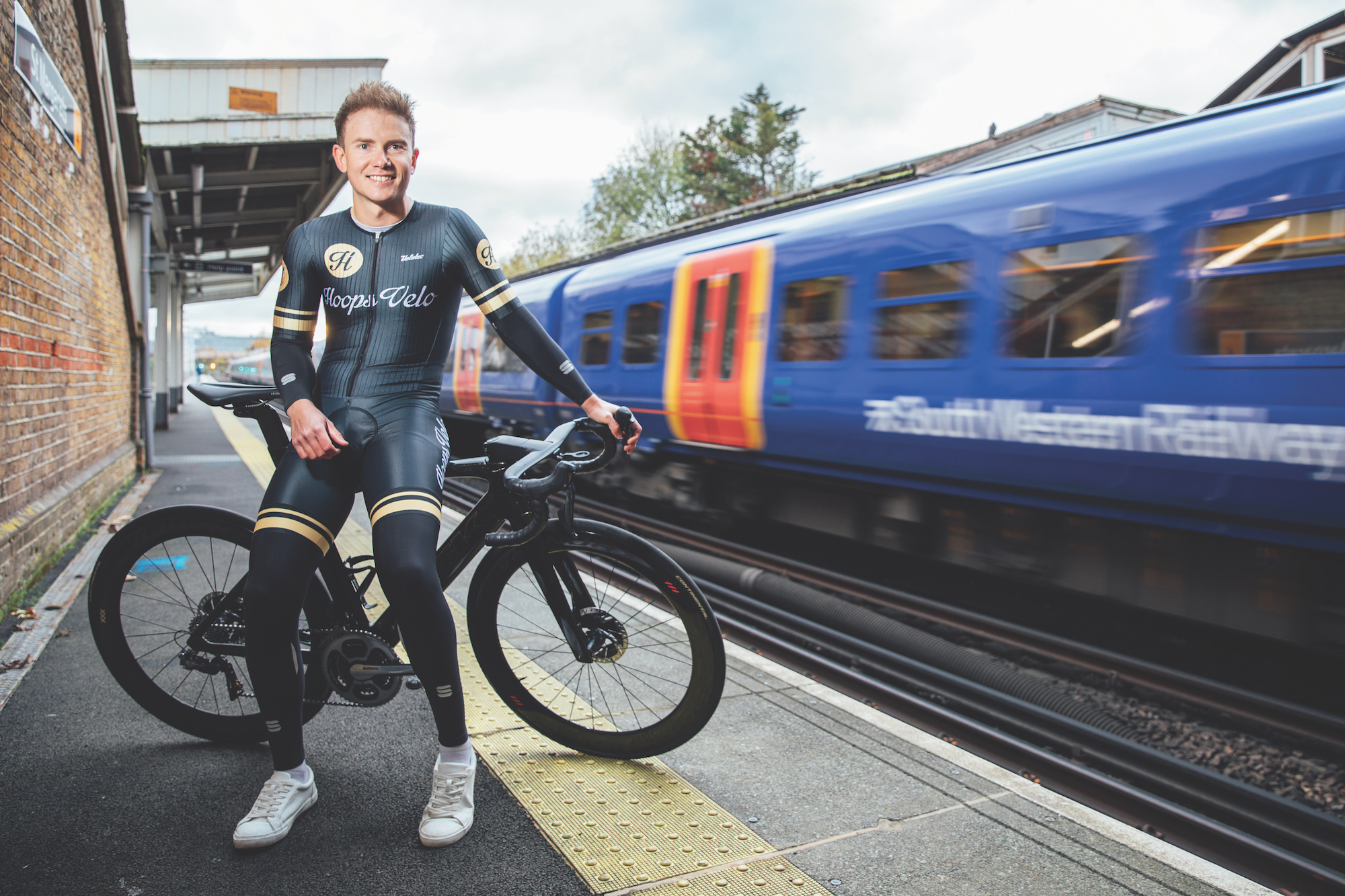
Train guard Boyman's learned to adjust to an irregular timetable

If you work full-time and also try to maintain a competitive level of bike fitness, you’re probably familiar with the following scenario: dragging yourself into the turbo den after a day at work, staring at the bike and wanting nothing more than to turn around and go to bed or divert to the sofa in front of the TV.
Combining work with hitting cycling performance goals can be a tightrope walk between progress and burnout. But get it right and the results are immensely rewarding. "Amateur athletes have much less time to train," muses former national champion and coach Matt Bottrill, who worked as a postman while dominating the domestic TT scene.
"They have to fit everything in around family and work, but it is possible." Although it’s often arduous, combining racing with a job can have an upside, as sports psychologist Dr Josephine Perry explains: "It can actually be beneficial for riders to work as well as race. It takes away lots of the pressures that can come with high performance, and means racing can be about trying to perform brilliantly, in spite of reduced time to train, rather than desperately trying not to mess up."
So how do top amateurs pack it all in? Let’s find out...
James Boyman
Age: 31
Job: Train guard
Get The Leadout Newsletter
The latest race content, interviews, features, reviews and expert buying guides, direct to your inbox!
Works: 42 hours per week
Trains: 12-15 hours a week
Hometown: London
Rides for: Hoops Velo
2019 highlight: 2nd — Les Ingman National B
I started racing when I was 12 years old, but when I went to college it seemed like almost anyone who was any good started riding full-time, so I got a bit disillusioned.
When I was 23 I had testicular cancer. Once I’d recovered, I had a go at riding full-time — by the age I was then, it was a matter of now or never. I knew I’d regret not doing it.
Unfortunately I didn’t have any particularly stand-out results, but I won three National
Bs in 2018 (Stockbridge Down RR, Jef Schils and John Walker) and set a new 10-mile time trial PB of 18.07.
>>> Cycling Weekly is available on your Smart phone, tablet and desktop
Last September I returned to work. I don’t regret having given it a bash. My work shifts are an issue: one day I’m up at 3.30am, the next I’m starting at 5pm and finishing at 2am. If I didn’t plan my meals well, I’d end up tucking into a MacDonald’s at Waterloo station at midnight, so I have to be organised.
I coached myself until June this year, and I wasn’t factoring-in the way work affects your Training Stress Score. Early and late shifts meant I could fit in four-hour rides, but I dug myself into a bit of a hole. Then a friend, Gary Chambers, started using me as a guinea pig during his coaching course. Towards the end of the season, I was hitting numbers within one per cent of where I was when I was full- time. The key to that improvement was finding a balance between resting and training. I went from doing 20 hours a week to 12-15 more intense hours, and it had the desired effect.
I work weekends and have had to take annual leave for some races, so I pick them carefully, targeting grippy National Bs. My best result this season was at the Les Ingman National B road race. I wanted to win, and broke away with around 30km to go. In the end, Marcin Białobłocki [multi TT competition record holder] bridged over and passed me when I was doing 600 watts! He’s on another level. But at least I held the bunch off for second place.
Boyman’s top tips: Rest! That doesn’t just mean taking rest days, but also getting plenty of sleep. I use heart rate variability tracking and I notice if I sleep badly it’s the one thing that has the biggest effect.
Choose your races carefully — too many amateurs race too much. I’m a big advocate of selecting target races rather than turning up to pin a number on three times a week.
Crystal Spearman
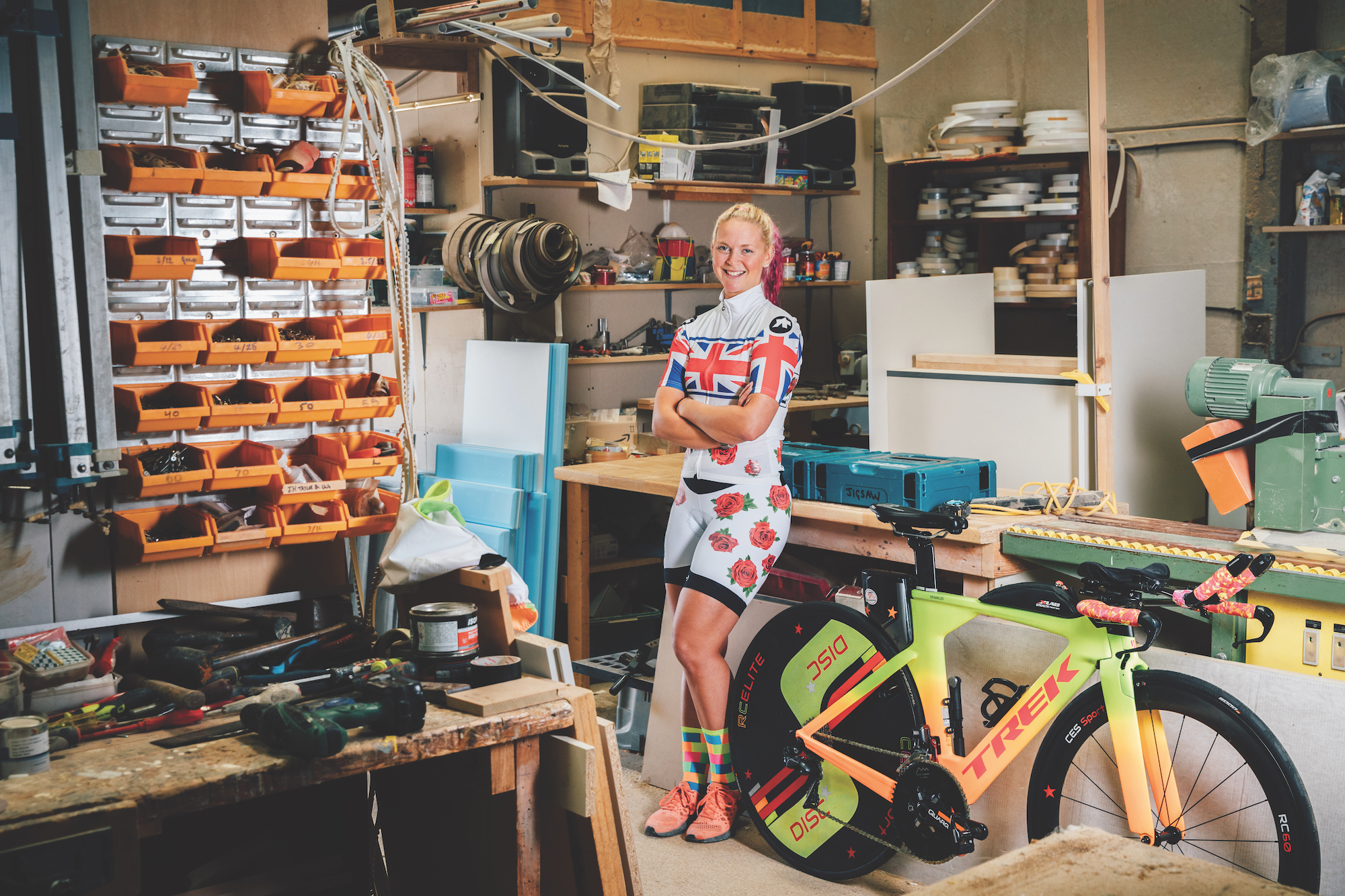
Age: 31
Job: Carpenter and builder
Works: 40 hours per week
Trains: 250 miles a week
Hometown: Barnstaple, Devon
Rides for: Born to Bike — Bridgetown Cycles
2019 highlights: 2nd — National, 24-hour Championships, 3rd — World 24-hour Championships
My friends say I’m a social experiment. Sometimes people are surprised to see
a woman doing my job; I just joke, "Yes, it was a surprise when I looked in the mirror this morning too!"
I spend my working day around men, so I find myself overcompensating — I like to wear a tutu on the podium!
My job has no typical day — it depends on the project. We could be knocking walls down one week, fitting kitchens the next; the physical intensity varies a lot. Training before work isn’t possible, so I do most of my training in the evening.
I get annoyed when I’m too tired to put my best into the session, but you have to go with the flow. I like routine, but it’s important to be flexible. I coach myself, so I can move sessions around depending on the work I’m doing.
My best events are 24-hour time trials. I favour the distance stuff because it’s more about you and the joy of riding your bike, rather than travelling to chase fast courses. I did try a few road events, but being self-employed, time trialling feels safer to me. I aim to ride about 250 miles a week, ideally outside. Cycling is my time. If I’ve had a hard day at work and the blokes have done my head in, it’s nice to get out and be free.
Before this job, I used to teach gymnastics. I do at least 15 minutes of core work every day, and it feels alien to me to go to bed without stretching — it’s a nightly routine. I still lift weights; I’ve always enjoyed it, and it’s beneficial for my job as well. We don’t have a
dining room anymore — it’s my bike and training space!
>>> Subscriptions deals for Cycling Weekly magazine
Spearman’s top tips: Set out what you want to do each week, but be prepared to be flexible. Remember, it’s not all about you — make time for family and friends. You might want to go out and ride all day, but sometimes you need to be prepared to cut it short.
Steph Post
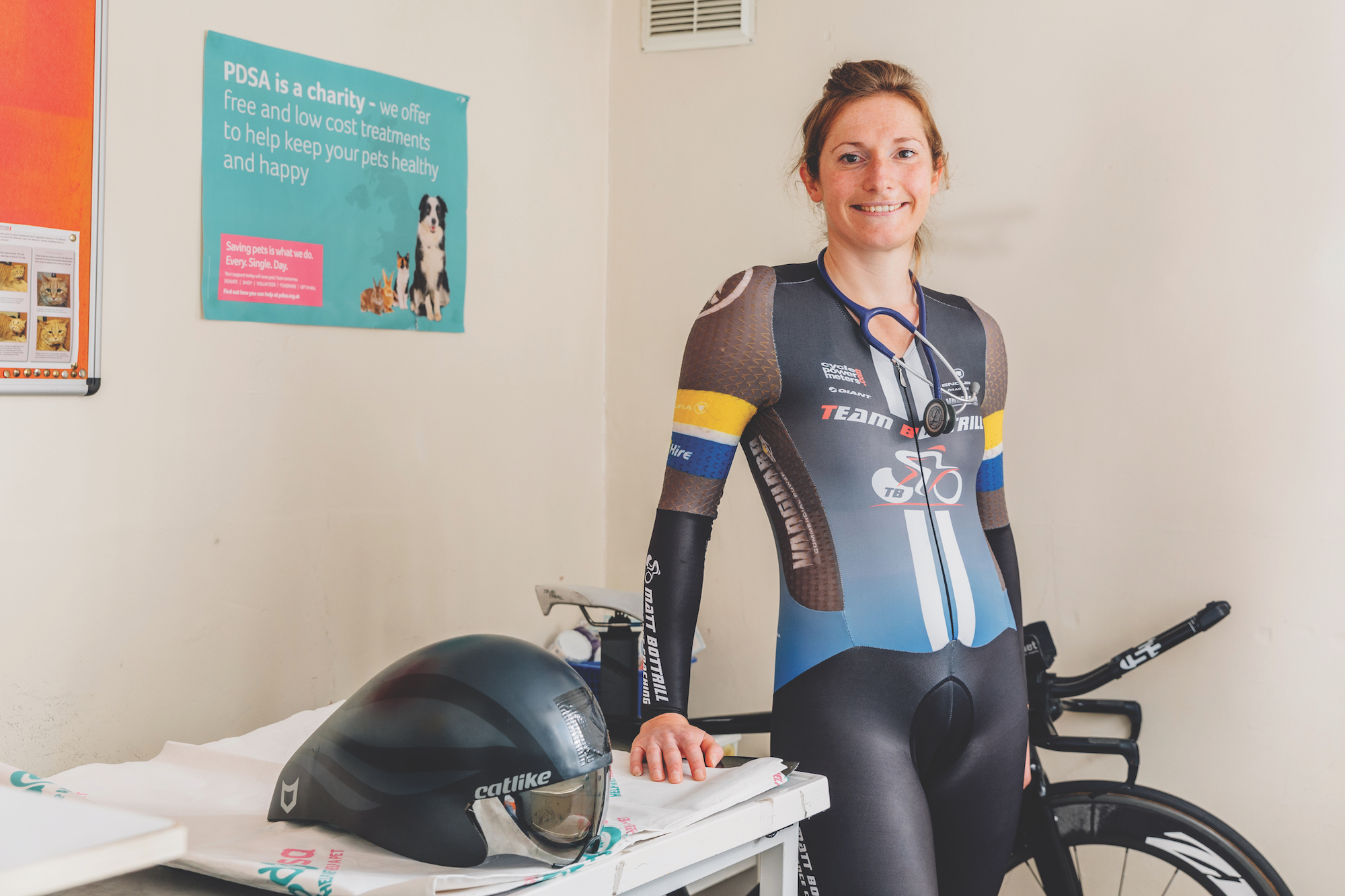
Age: 34
Job: Veterinary surgeon
Works: 38 hours per week
Trains: 6-8 hours a week
Hometown: Bristol
Rides for: Team Bottrill
2019 highlights: 1st — Welsh National 25, 1st — Duo Normand 2-up
My work is a little bit like a time trial: from the start of the day to the finish, I’m pretty much head-down. When I tell people about my job, they tend to remember. I treat a lot of French Bulldogs that can’t give birth naturally — sometimes people ask me at time trials how many caesareans I’ve carried out that day!
Being on call overnight is tough, but you do get the morning off, and have the next afternoon off. It means I can do some extra training on the road, especially in winter. I am changing roles soon; there will be less on-call work, so I’ll need to get a turbo trainer set up in the basement.
Having a coach helps massively with achieving a good balance. My coach makes sure my training is consistent; it gives me the accountability I need, though I wouldn’t say I’m the most obedient — I do a bit of reshuffling. My training typically consists of mainly short, hard sessions. It’s about getting the best bang for my buck, time-wise.
As well as winning the Welsh National 25, I was very proud of the way I handled a hectic week in September: I raced the rescheduled National 25 on Saturday, coming fourth; the Amateur World Championship Gran Fondo in Poland on the Wednesday, for bronze; and the National 10-time trial the next Saturday, coming 11th in a stacked field. Lots of people said, "That week must have been really hard," but actually work was very stressful over that period and so racing was an amazing outlet.
I genuinely believe having a job is helpful; it’s not a hindrance. I take my cycling seriously, but it is my hobby. I know I’ll never be a pro but it wouldn’t be worth the trade-off anyway for the other identity that working gives me.
Post’s top tips: If you’re time-poor, focus is important. Identify which areas you need to work on. I did some testing with the Boardman Performance Centre, found that my
pedalling efficiency needed work, and I’m building strength in the gym.
Regard having work to do alongside your cycling as a benefit — I do! Having such a busy year at work probably helped my racing this season, as it took my mind off it. And if I hadn’t had good results, there would have been no pressure — work provides balance
and perspective.
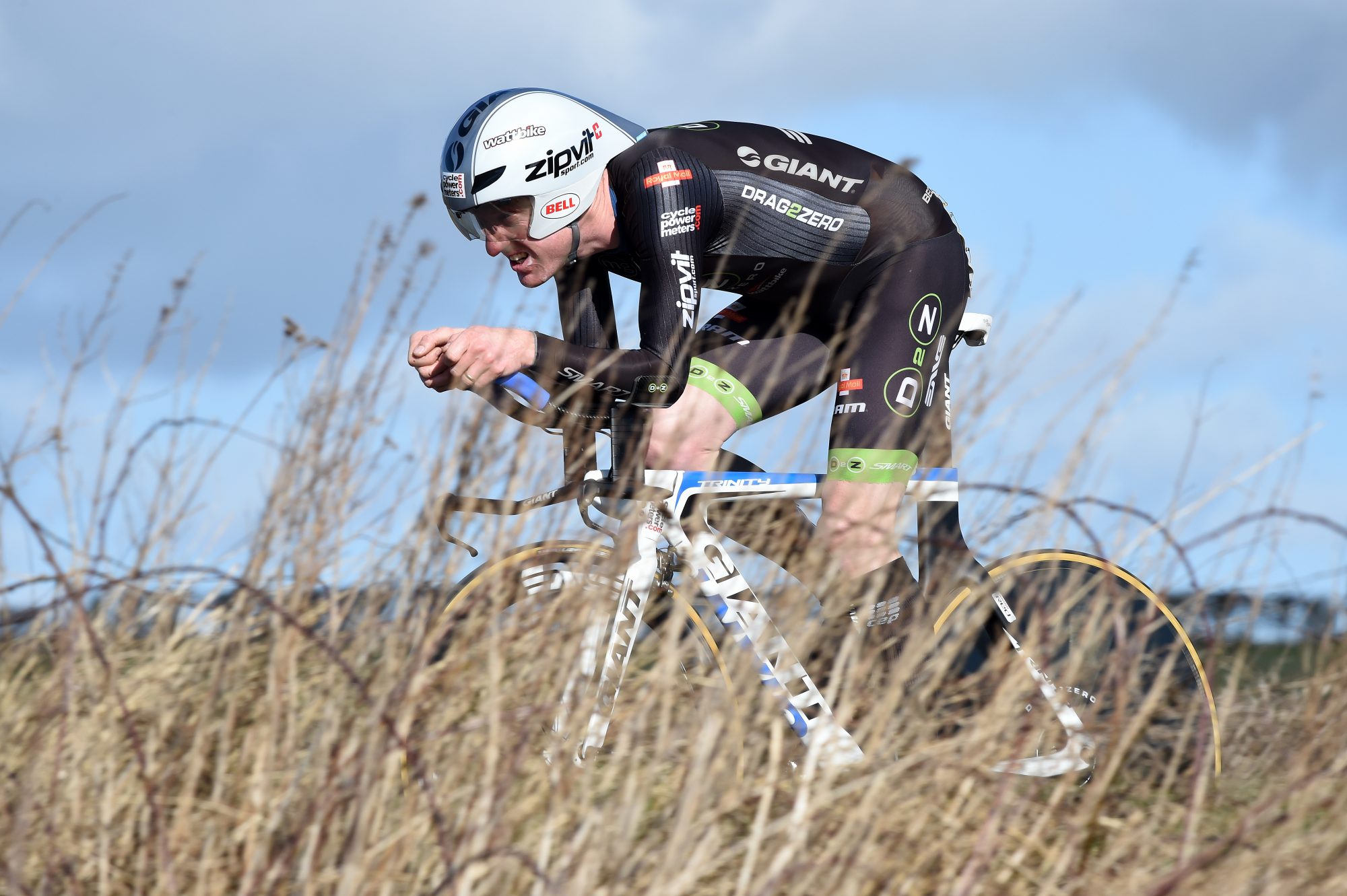
Former national champion Matt Bottrill worked as a postman while breaking TT records. We asked his advice on squeezing in training around a full-time job
What are your key training rules for amateurs who work full-time?
The key for amateurs is consistency, and being realistic about what can be achieved in the time they have available. Being as organised as possible is imperative, and following a structured training programme has very definite benefits.
What about family commitments on top of work?
For some people, these can help. In my own experience, I found that when presented with less time to train, I had to become really consistent and intelligent in my approach to training.
Mentally, I found a new strength from wanting to do something for my family,
to make them proud.
Those working at a desk face different struggles to those on their feet — any specific advice?
If you’re largely sedentary, keeping mobile is key — move around and stretch when you can. If you’re mobile, find ways to take the load off when possible, and maintain a good routine of eating and drinking plenty of water.
Photos by Daniel Gould, Andy Jones, Kimroy Photography
This feature originally appeared in the print edition of Cycling Weekly, on sale in newsagents and supermarkets, priced £3.25.

Thank you for reading 20 articles this month* Join now for unlimited access
Enjoy your first month for just £1 / $1 / €1
*Read 5 free articles per month without a subscription

Join now for unlimited access
Try first month for just £1 / $1 / €1
Michelle Arthurs-Brennan the Editor of Cycling Weekly website. An NCTJ qualified traditional journalist by trade, Michelle began her career working for local newspapers. She's worked within the cycling industry since 2012, and joined the Cycling Weekly team in 2017, having previously been Editor at Total Women's Cycling. Prior to welcoming her first daughter in 2022, Michelle raced on the road, track, and in time trials, and still rides as much as she can - albeit a fair proportion indoors, for now.
Michelle is on maternity leave from April 2025 until spring 2026.
-
 Tadej Pogačar flies to dominant victory at La Flèche Wallonne
Tadej Pogačar flies to dominant victory at La Flèche WallonneSlovenian takes second win at Belgian classic ahead of Kévin Vauquelin and Tom Pidcock
By Tom Thewlis
-
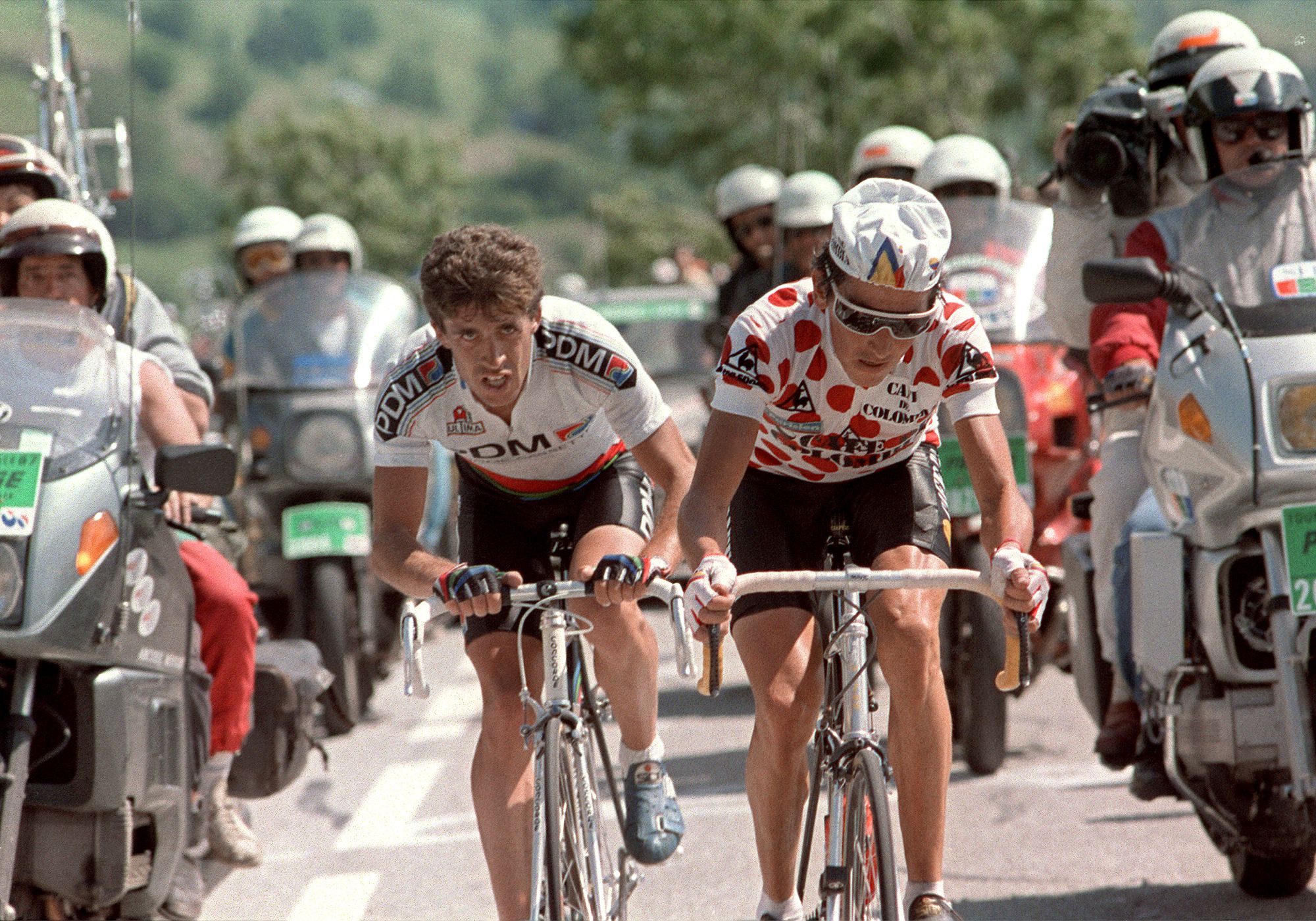 Colombian climbing star and former Vuelta a España winner Lucho Hererra could be investigated over murders of four people
Colombian climbing star and former Vuelta a España winner Lucho Hererra could be investigated over murders of four peopleA judge has called for an investigation into the former Vuelta winner who is alleged to have worked with paramilitary groups in Colombia
By Tom Thewlis